|
|
|
Sort Order |
|
|
|
Items / Page
|
|
|
|
|
|
|
| Srl | Item |
| 1 |
ID:
123029


|
|
|
|
|
| Publication |
2013.
|
| Summary/Abstract |
In this article we aim to illustrate both the progress and the stalemates of the US and Japanese strategies to fortify the Okinawan Islands as a bulwark against China. As a conceptual tool to analyze the accommodation and resistance of militarization, we use the notion of a complex interplay of state, market, and societal actors, which showcases the process of mediating and recalibrating risks perceived by policymakers in Tokyo in response to the rise of China. In this process, risk has been shifted to individual stakeholders within society. We argue that the full-scale fortification of the Okinawan Islands will be hard to achieve because of the resistance of local residents and anti-base activists, as well as China's military and commercial strategies to circumvent any form of blockade.
|
|
|
|
|
|
|
|
|
|
|
|
|
|
|
|
| 2 |
ID:
188584
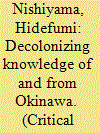

|
|
|
|
|
| Summary/Abstract |
This paper explores the militarized situation of Okinawa Island and the ongoing struggles and challenges that Okinawans continue to confront. Particular focus is placed on how Okinawans challenge dominant colonial forms of knowledge, which assert that the U.S. military presence on the island is beneficial for Okinawan and Japanese people. After contextualizing Okinawa Island within contemporary American imperial geopolitics and outlining the current state of the island, the paper looks at three different, yet closely integrated, ways in which Okinawans, led by activists and progressive local officials, challenge the dominant narrative on the U.S. military. By questioning dominant assumptions about security, a base-dependent economy, and Okinawans’ indigenous status, these movements contribute to the decolonization of knowledge, an important step toward the demilitarization of the island. The paper concludes with a discussion of remaining challenges for decolonial knowledge production.
|
|
|
|
|
|
|
|
|
|
|
|
|
|
|
|
| 3 |
ID:
188585
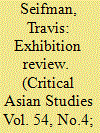

|
|
|
|
|
| Summary/Abstract |
The exhibition “Portraits of Ryukyu,” held at the Okinawa Prefectural Art Museum from November 2021 through January 2022, featured works by sixteen artists with close ties to Okinawa, highlighting the diversity of themes, approaches, styles, and media contained within the category of modern and contemporary Okinawan art, and expanding understandings of that canon. The fifteen women and one x-gender artist featured in the exhibition, some of whom were born and raised in Okinawa and some abroad, some with mixed ethnic backgrounds and others with Japanese backgrounds but trained and educated in Okinawa, address not only themes of gender, war, tradition, identity, and the ongoing U.S. military presence in the islands, but also of family, memory, modernity, labor, consumerism, and of historical and contemporary ties with the experiences of people in Taiwan, Vietnam, Hawai’i, and elsewhere.
|
|
|
|
|
|
|
|
|
|
|
|
|
|
|
|
| 4 |
ID:
098400
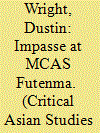

|
|
|
|
|
| Publication |
2010.
|
| Summary/Abstract |
In 1960, a Japanese prime minister was forced to resign after he committed Japan to an unpopular security relationship with the United States. In 2010, exactly fifty years later, the security relationship with the United States, centered on the stationing of a vast U.S. base complex in Japan, has unseated a prime minister who came to office just last year with an over 70 percent approval rating. In the small southern prefecture of Okinawa, where 75 percent of the U.S. military in Japan is stationed, the continued presence of the unpopular Futenma air base has become a lodestone for Okinawan frustration. High-level talks to remove Futenma from the crowded city of Ginowan have been ongoing since 1996, yet nothing has been accomplished. On 25 April 2010, an estimated 90,000 people rallied in Okinawa and demanded the base be removed from the prefecture completely, and not simply relocated to a location near the city of Nago. This essay attempts to explain Washington's central role in creating the problem and argues that Futenma is an unnecessary burden on the people of Okinawa and on cash-strapped Japanese and American taxpayers.
|
|
|
|
|
|
|
|
|
|
|
|
|
|
|
|
| 5 |
ID:
164948
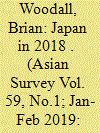

|
|
|
|
|
| Summary/Abstract |
New and old domestic issues challenged the Abe government, while “Trump shocks” rattled Japan’s foreign relations. Domestically, Abenomics produced mixed results, the depopulation bomb continued ticking, and Abe’s reelection presaged a possible attempt at constitutional amendment.
|
|
|
|
|
|
|
|
|
|
|
|
|
|
|
|
| 6 |
ID:
107156
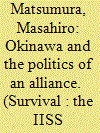

|
|
|
|
|
| Publication |
2011.
|
| Summary/Abstract |
The problem of whether a US Marine Corps air base in Okinawa (Futenma Air Station) should be relocated to a new facility or moved off the island entirely has been a fishbone in the throat of the Japan-US alliance. Okinawa's location makes it a strategic asset for US regional and global military strategy: the island provides easy access to the Korean Peninsula and the Taiwan Strait and serves as a crucial hub of America's global military network of bases and facilities.
|
|
|
|
|
|
|
|
|
|
|
|
|
|
|
|
| 7 |
ID:
019123
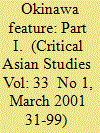

|
|
|
|
|
| Publication |
March 2001.
|
| Description |
31-99
|
|
|
|
|
|
|
|
|
|
|
|
|
|
|
|
| 8 |
ID:
188581
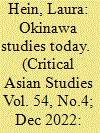

|
|
|
|
|
| Summary/Abstract |
The recent explosion of work on Okinawa focuses attention on Okinawans in Japan’s empire, the diaspora, the American postwar order, and the more distant past. Another major topic is the multiple ways that individuals experience their relationship to Okinawan identity. This research matches the energy and creativity of Okinawan culture today. Popular frustration with the presence of U.S. military bases, enabled by the Japanese government, remains an inescapable issue in the background.
|
|
|
|
|
|
|
|
|
|
|
|
|
|
|
|
| 9 |
ID:
187171
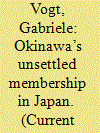

|
|
|
|
|
| Summary/Abstract |
Fifty years after its “reversion” to Japan, the burden of hosting US military bases is one of the perceived injustices that have limited the southernmost prefecture’s sense of national belonging.
|
|
|
|
|
|
|
|
|
|
|
|
|
|
|
|
| 10 |
ID:
099008


|
|
|
| 11 |
ID:
100762
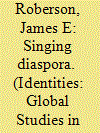

|
|
|
|
|
| Publication |
2010.
|
| Summary/Abstract |
This article examines songs of departure and return that trace the Okinawan diasporic experience as these narratives have been composed inside the Okinawa ethnic homeland. Placing these Okinawan songs of migration within historical and political contexts, I argue that they act as sites of homeland cultural memory and that, as such, they participate in the reflexive internalization of a "diaspora consciousness" in cultural identity construction in the Okinawan homeland, which may thereby also be seen as a "diaspora space."
|
|
|
|
|
|
|
|
|
|
|
|
|
|
|
|
| 12 |
ID:
179012


|
|
|
|
|
| Summary/Abstract |
This study examines how different cultural groups forge a shared longing for the past, or transcultural nostalgia. The article suggests that each group’s past and present political-economic conditions are key contributors to transcultural nostalgia. Furthermore, it suggests that travel between spaces is a key means of transcultural remembering. It historically and ethnographically examines the transcultural nostalgia among Okinawans who had migrated to the Northern Mariana Islands under the Japanese rule and repatriated after WWII and the indigenous islanders who had grown up as Japanese colonial subjects, as well as the repatriates’ post-war ‘spirit-consoling’ pilgrimages to the Marianas.
|
|
|
|
|
|
|
|
|
|
|
|
|
|
|
|
| 13 |
ID:
110984


|
|
|
|
|
| Publication |
2012.
|
| Summary/Abstract |
The Japanese and United States governments have decoupled plans to move US marines off Okinawa from the relocation of an airbase on the island. The US Department of State said in a statement: "The US has conducted a strategic review of its defence posture in Asia." It added that this would result in the US and Japan "delinking both the movement of marines to Guam and resulting land returns south of Kadena [on Okinawa Island] from progress on the Futenma Replacement Facility. We are also reviewing the unit composition and the number of marines who will relocate to Guam." The Futenma Replacement Facility refers to plans to close Marine Corps Air Station (MCAS) Futenma, which is in the centre of Ginowan city, and transfer its operations to a new offshore runway at Camp Schwab in Nago, northern Okinawa. The 2006 United States-Japan Roadmap for Realignment Implementation document states that about "8,000 III Marine Expeditionary Force personnel and their approximately 9,000 dependants will relocate from Okinawa to Guam by 2014". Under leaked revised plans, 4,700 personnel and their dependants will move to Guam, with the rest dispersed around the Asia-Pacific region.
|
|
|
|
|
|
|
|
|
|
|
|
|
|
|
|
| 14 |
ID:
074880
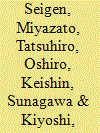

|
|
|
|
|
| Publication |
2006.
|
| Summary/Abstract |
For 60 years the small island prefecture of Okinawa has borne a grossly disproportionate share of the burden of hosting US military bases in Japan. As Tokyo and Washington discuss the realignment of US forces here, their top priority should be to ease Okinawa’s burden. Unfortunately, the Japanese government seems to be failing to take advantage of this opportunity.
|
|
|
|
|
|
|
|
|
|
|
|
|
|
|
|
| 15 |
ID:
124055
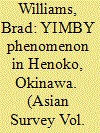

|
|
|
|
|
| Publication |
2013.
|
| Summary/Abstract |
This paper examines the reasons behind Henoko's decision to accept a controversial U.S. military base. It highlights the impact of a path dependency created amid early postwar socioeconomic conditions of deprivation and political compulsion, resulting in the Okinawan village's structural incorporation into the U.S. base economy.
|
|
|
|
|
|
|
|
|
|
|
|
|
|
|
|
|
|
|
|
|